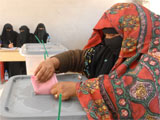Yemen: Seek Reform Not Retrenchment
By Dominic Moran for ISN
This month's violent protests in restive southern Yemen have underlined the need for a shift in priorities in which security challenges are seen as both a symptom of and reflexively linked to the need for far-ranging civil and governance reform.
A number of pro-secession demonstrators were killed in days of violent protests in the south from 7 July, in which the flag of the former South Yemen featured prominently.
The open expression of secessionist sentiment during the rallies is important, effectively usurping the focus of initial protests on the alleged failure of the government to meet its commitments to demobilized soldiers of the South Yemen army and to address alleged discrimination against southerners in state employment and disbursements.
In May, President Ali Abdullah Saleh offered an amorphous "external pagelocal ruling systemcall_made" in the south. The initiative was firmly rejected by protest leaders as a ploy.
With tensions rising, the government has sought to impose strictures on related reportage. On Thursday, journalist Anis Monssor Hameeda was sentenced to 14 months in jail over articles that allegedly harmed national unity - a charge also laid against six newspapers whose publications were suspended in May.
Yemen's multiple security challenges, which include a recent increase in al-Qaida attacks, tribal violence and the simmering al-Houthi rebellion in the north, mean the government is ill-placed to cope with burgeoning secessionist sentiment.
However, while worrying, the ongoing protests in the south are unlikely to lead to a full-scale insurrection.
A primary causative factor of instability in Yemen is endemic, deepening economic distress. A second is the failure to develop open, inclusive political mechanisms for what is a managed society in which myriad factional, sectarian and tribal elements are necessarily played off against each other by Sana'a.
Indeed, the rising southern foment; its increasingly defiant secessionist tenor; and the effective militarization of the response thereto are clear signs of the inability of the government to address both southern concerns and the protest movement leadership itself.
Troublingly, this is occurring at a time when moves to promote a political opening are foundering in the wake of the two-year postponement of parliamentary elections, initially scheduled for April.
The opposition Joint Meeting Parties (JMP) coalition agreed to the poll delay but is extremely unlikely to be in a position to challenge Saleh's General People's Congress (GPC) for power in 2011.
Under pressure to promote unity, the GPC invited the JMP to a national dialogue last Thursday. The opposition coalition has so far refused, conditioning further talks on government moves to ease security strictures in the south.
The GPC and JMP remain deadlocked on the establishment of the Supreme Commission for Elections and Referendum, intended as the primary vehicle for electoral reform.
In the meantime, the government is looking to deflect outside pressure for meaningful change through playing on its embattled state and efforts to combat al-Qaida and other radical militant groups.
Ultimately, the failure of the US and other key foreign partners to push consistently and forcefully for civil, press and political reform and their obsessive focus on security issues will only exacerbate the current chaos enveloping the country and increase the prospects for long-term system collapse.

